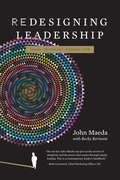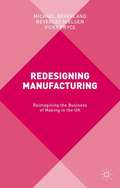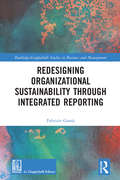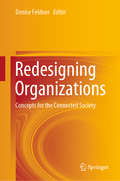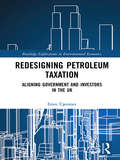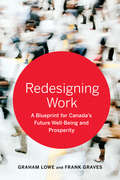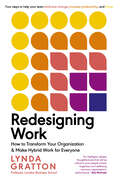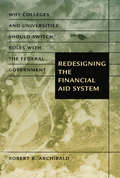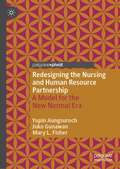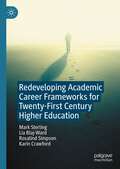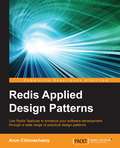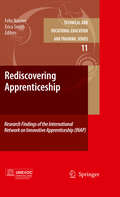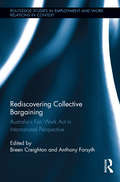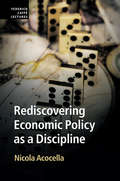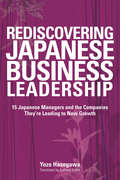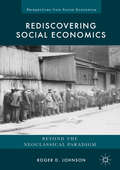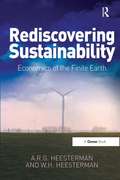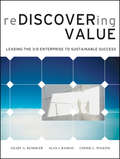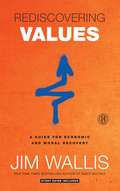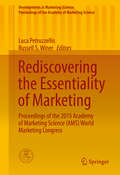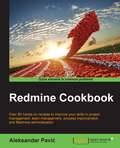- Table View
- List View
Redesigning Leadership (Simplicity: Design, Technology, Business, Life)
by John MaedaLessons for a new generation of leaders on teamwork, meetings, conversations, free food, social media, apologizing, and other topics. When designer and computer scientist John Maeda was tapped to be president of the celebrated Rhode Island School of Design in 2008, he had to learn how to be a leader quickly. He had to transform himself from a tenured professor—with a love of argument for argument's sake and the freedom to experiment—into the head of a hierarchical organization. The professor is free to speak his mind against “the man.” The college president is “the man.” Maeda has had to teach himself, through trial and error, about leadership. In Redesigning Leadership, he shares his learning process. Maeda, writing as an artist and designer, a technologist, and a professor, discusses intuition and risk-taking, “transparency,” and all the things that a conversation can do that an email can't. In his transition from MIT to RISD he finds that the most effective way to pull people together is not social networking but free food. Leading a team? The best way for a leader to leverage the collective power of a team is to reveal his or her own humanity. Asked if he has stopped designing, Maeda replied (via Twitter) “I'm designing how to talk about/with/for our #RISD community.” Maeda's creative nature makes him a different sort of leader—one who prizes experimentation, honest critique, and learning as you go. With Redesigning Leadership, he uses his experience to reveal a new model of leadership for the next generation of leaders.
Redesigning Manufacturing
by Michael Beverland Beverley Nielsen Vicky PryceManufacturing in the UK has an image problem. Although this image problem is more fiction than fact, it nonetheless has an impact on the sector's ability to attract staff, capital, and policy interest. Redesigning Manufacturing seeks to redress this situation by focusing on the real successes of the sector and the strategies used by makers to achieve sustainable results. In so doing, we broaden the debate about manufacturing to encompass issues of branding, design and creativity, craft, market creation, and supportive ecosystems. Rather than viewing the future of the manufacturing sector as reliant solely on productivity improvements, the pursuit of high technology markets, and investments in science, engineering, technology and maths, this book highlight the connectedness and complexity of modern manufacturing in the UK. Drawing on these insights and the success of many Midlands-based manufacturers the authors explore a more nuanced industrial policy.
Redesigning Organizational Sustainability Through Integrated Reporting (Routledge-Giappichelli Studies in Business and Management)
by Fabrizio GranàThis book explores the role of accounting and reporting practices, such as corporate and integrated reports, as organizations attempt to represent sustainability. By relying upon the case of a large international oil and gas company and its recent development of integrated reporting, this book argues that the ambiguity of sustainability as a concept, and the impossibility to fully capture it through accounting and reporting practices, does not mean that any attempt to represent it inevitably leads to distortion or obfuscates ‘reality’. Rather, the way in which this concept is presented through accounting and reporting practices can have a constructive effect on the organization through the aspirations that these representations entail. The book demonstrates that accounting and reporting practices, such as integrated reporting, are not expected to offer complete representations of organizations’ sustainability. Rather, these practices offer a number of representations (e.g. graphs, diagrams, tables, grid) that affect the way in which organizations understand and report on sustainability, changing its meaning over time. Finally, this study demonstrates that undefined concepts, such as ‘sustainability’, and practices, such as ‘integrated reporting’, mutually construct each other. The attempt to represent sustainability within the organization and the debates that this process generates, make accounting and reporting practices unfold themselves, and evolve. The book will be of interest to scholars in the field of accounting, management and sustainability, as well as practitioners from a wide array of additional fields, such as planning and control, organizations’ strategy, business ethics, corporate social responsibility and corporate reporting.
Redesigning Organizations: Concepts for the Connected Society
by Denise FeldnerThis book offers readers a deeper understanding of the Cyberspace, of how institutions and industries are reinventing themselves, helping them excel in the transition to a fully digitally connected global economy. Though technology plays a key part in this regard, societal acceptance is the most important underlying condition, as it poses pressing challenges that cut across companies, developers, governments and workers. The book explores the challenges and opportunities involved, current and potential future concepts, critical reflections and best practices. It addresses connected societies, new opportunities for governments, the role of trust in digital networks, and future education networks. In turn, a number of representative case studies demonstrate the current state of development in practice.
Redesigning Petroleum Taxation: Aligning Government and Investors in the UK (Routledge Explorations in Environmental Economics)
by Emre ÜşenmezSince its inception some 40 years ago, petroleum-specific taxation in the UK has been subject to numerous modifications. Often these modifications were brought into place not only to sufficiently incentivise the investors but also to capture a fair share for the government. However, it is evident from the frequency of changes that finding the right balance between these two aims is no easy matter. Such a balance, and the consequent fiscal stability, is necessary for the long-term relationship between the parties to endure to their mutual benefit. Still, it does not take much for one or other party to feel that they are out of balance. As a consequence, one party feels that the other party is taking an undue proportion of the value generated and that they are losing out. Yet achieving that balance and fiscal stability is possible. To understand this possibility, this book first clarifies what is meant by sufficient incentivisation and fair share before developing a new fiscal system that manages this balance and stability. Such clarification yields objective criteria against which to assess not only the existing regime, but also the newly proposed regime. This approach is further complemented by the critical analysis of the fiscal legislative framework and the evaluation of the legal positions of specific contractual elements and mechanisms found within that framework. This latter analysis is important in order to reduce the legal uncertainty such elements may create, which can otherwise lead to further reactive amendments and revisions to the fiscal regime in the future.
Redesigning Work: A Blueprint for Canada's Future Well-being and Prosperity
by Graham Lowe Frank GravesCanada's future prosperity is of utmost concern to citizens, industry leaders and policy makers. Using original public opinion research from EKOS, Redesigning Work argues that improving people's jobs and workplaces can unlock the potential to strengthen Canada's economy and improve the well-being of Canadians. Graham Lowe and Frank Graves are two of Canada's leading experts on work and public opinion. In Redesigning Work the authors provide a blueprint for the future of work in Canada by identifying practical ways to make work more motivating, rewarding and productive. The authors provide fuel for employers, workers, policy makers, HR professionals, and NGOs to combat the negative trends many Canadians associate with their future economic prospects. The book paints an optimistic picture of the future of work by addressing job stress, work-life balance, skill use and engagement.
Redesigning Work: How to Transform Your Organization and Make Hybrid Work for Everyone (Management on the Cutting Edge)
by Lynda GrattonHow do we make the most of the greatest global shift in the world of work for a century and radically redesign the way we work—forever?Professor Lynda Gratton is the global thought-leader on the future of work. Drawing on thirty years of research into the technological, demographic, cultural, and societal trends that are shaping work and building on what we learned through our experiences of the pandemic, Gratton presents her innovative four-step framework for redesigning work that will help you: • Understand your people and what drives performance • Reimagine creative new ways to work • Model and test these approaches within your organization • Act and create to ensure your redesign has lasting benefits Gratton presents real-world case studies that show companies grappling with work challenges. These include the global bank HSBC, which built a multidisciplinary team to understand the employee experience; the Japanese technology company Fujitsu, which reimagined three kinds of &“perfect&” offices; and the Australian telecommunications company Telstra, which established new roles to coordinate work across the organization. Whether you&’re working in a small team or running a multinational, Redesigning Work is the definitive book on how to transform your organization and make hybrid working work for you.
Redesigning the Financial Aid System: Why Colleges and Universities Should Switch Roles with the Federal Government
by Robert B. ArchibaldAs the cost of higher education continues to rise, students and their families find it increasingly difficult to navigate the financial aid maze. In Redesigning the Financial Aid System, economist Robert Archibald examines the history of the system and its current flaws, and he makes a radical proposal for changing the structure of the system. Archibald argues that one of the problems with the current model—in which universities are responsible for the majority of grants while the federal government provides student loans—is that a student cannot know the final price of attending a given institution until after he or she has applied, been accepted, and received a financial aid offer. As a result, students remain largely uninformed about the cost of their college educations until very late in the decision-making process and so have difficulty making a timely choice. In addition, financial aid information is kept private, creating confusion over the price of a college education and the role of financial aid.Under Archibald's proposed reforms, the federal government would assess a student's financial need and provide need-based grants, while institutions would be responsible for guaranteeing student loans. Not only would this new system demystify financial aid and allow students to be better informed about the cost of college earlier in the process, but it would greatly simplify the application procedure and prevent financial aid allocation from contributing to the problem of rising tuition costs. Archibald's clear explanation of the current system—its impact, strengths, and weaknesses—as well as his plans for reform, will be of interest to educators, administrators, students, and parents.
Redesigning the Nursing and Human Resource Partnership: A Model for the New Normal Era
by Yupin Aungsuroch Joko Gunawan Mary L. FisherThis book focuses on the partnership between nursing and human resource management in hospital administration. In doing so, it addresses the barriers and challenges in the process of competence-based recruitment and selection, training and development, rewards and benefits, performance appraisal, career planning and development, and succession planning of nurses in the hospitals, specifically to face the new normal era. There is no doubt that the demand for nurses has been great during the COVID-19 pandemic. Nurses have become the heroes in the battle of the virus, and their hard work should be appreciated. Yet, burnout, stress, and depression among nurses have become the main issues during the pandemic. Some nurses leave their jobs and profession due to an excessive and stressful workload. This crisis puts a new focus on human resource management in hospital administration to retain their nurses, and also improve the quality of care. In addition to addressing the points above, the book also offers recommendations to resolve the barriers and challenges of competence-based human resource management by emphasizing the partnership between nursing and human recourses to influence nurse practice and human resource policy positively.
Redeveloping Academic Career Frameworks for Twenty-First Century Higher Education
by Karin Crawford Lia Blaj-Ward Rosalind Simpson Mark SterlingThis book spotlights new pathways for academic career progression beyond the traditional teaching-and-research model. It sets out key parameters for constructive conversations about alignment to these new pathways, which are examined from the point of view of individuals at different stages in their careers, as well as at an institutional level. The authors offer guidance on how to implement new pathways and how to realign professional development for academics so that the new pathways fully achieve their purpose to support universities’ contribution to society. The volume will appeal to academics in higher education, as well as those involved in the redesign and implementation of academic career frameworks from a variety of positions in a university.
Redfin
by Julia Kelley Marco Di MaggioRedfin, a technology-powered residential real estate brokerage, was founded in 2002 with the intention of using technology to disrupt the real estate industry. Over the next 15 years, Redfin made several changes to its business model. Initially, the company provided less support than a traditional real estate brokerage but helped home buyers and sellers save more money. Over time, in response to customer feedback, Redfin increased the level of customer service it provided while decreasing the amount customers saved, instead relying on its unique online tools to differentiate itself from other real estate brokerages. In July 2017, Redfin went public at a $1.73 billion valuation. Now, in late 2017, CEO Glenn Kelman had to decide what Redfin’s top strategic priority should be. Redfin could try to increase its market share, which was currently less than 2% even in the company’s top markets, or it could focus on balancing costs and improving its bottom line.
Redfin: Redefine Real Estate
by Hong Luo Huafeng YuFounded in 2004, Redfin envisioned a light-touch model in which clients self-served using the digital platform in exchange for a significantly lower fee than traditional agents. Realizing the narrow appeal of its initial model, Redfin had made significant changes to its strategy while maintaining some key distinctive choices. As of 2016, Redfin served in more than 80 markets throughout the U.S., employed over 700 full-time agents, and had grown over 40% annually since 2014. With additional capital raised through an IPO, Glenn Kelman faced decisions on how to allocate these resources in order to grow. Should Redfin adjust its advertising strategy? Should it reconsider the policy of hiring lead agents only as full-time employees? Should Redfin purchase homes and hold inventories?
Redifferentiating Products and Services: Employ an Entrepreneurial Mindset
by Rita Gunther Mcgrath Ian MacmillanThe current business environment is tumultuous and full of uncertainty. What you need is an entrepreneurial mindset--a way of thinking about your business that captures the benefits of uncertainty. The key aspect of establishing an entrepreneurial mindset is encouraging everyone to find opportunities to change your business model. This chapter focuses on redifferentiating products and services using consumption chain analysis and quizzing. This chapter is excerpted from "The Entrepreneurial Mindset: Strategies for Continuously Creating Opportunity in an Age of Uncertainty."
Redis Applied Design Patterns
by Arun ChinnachamyWith new data stores making their way onto the market, it's necessary for businesses to understand the features and techniques to use data stores most effectively. Redis Applied Design Patterns is designed to guide you into the world of Redis and will help you understand how business problems can be solved using Redis in your application stack. This book introduces you to the NoSQL way of thinking and how it is different from SQL. It helps you understand various functionality of Redis through a series of use cases designed for you to learn the more complex and less well-known features of Redis in an incremental way. By the time you've read this book, you will be capable of designing a system using Redis. This book will guide you through various use cases along with code samples, easy-to-understand diagrams, and tips to help you take advantage of Redis. The book explains the benefits of adding Redis to the application stack and discusses various practical use cases for Redis such as the caching system, commenting system, and social networking.
Rediscovering Apprenticeship
by Felix Rauner Erica SmithThe rediscovery of the value of apprenticeships has been one of the most significant trends in vocational education in recent years, and has prompted an array of research and development projects in countries around the world. In this volume, the renewed interest in the apprenticeship tradition and the various steps towards the implementation of innovative apprenticeship programmes are analysed and discussed from different perspectives. Beginning with a number of chapters that describe recent developments in apprenticeship training in different national contexts, the book moves on to analyze the way in which both the quality and profitability of apprenticeship act in concert as the most influential drivers of innovation in this field. In sum, this book makes an important contribution to the international literature on apprenticeship. It draws together some of the leading researchers in the area, and with its overview of a number of national Vocational Education and Training (VET) projects, provides a body of knowledge on current practices and issues that has previously been lacking in this complex interdisciplinary field. The lessons learned from countries' experiences, as presented in this book, provide a valuable platform for policy-makers and scholars alike.
Rediscovering Collective Bargaining: Australia's Fair Work Act in International Perspective (Routledge Studies in Employment and Work Relations in Context)
by Breen Creighton Anthony ForsythThis book examines countries that have tried, with varying degrees of success, to use legislative strategies to encourage and support collective bargaining, including Australia’s Fair Work Act. It is the first major study of the operation and impact of the new collective bargaining framework introduced under the Fair Work Act, combining theoretical and practical perspectives. In addition, a number of comparative pieces provide rich insights into the Australian legislation’s adaptation of concepts from overseas collective bargaining systems – including good faith bargaining, and majority employee support as the basis for establishing bargaining rights. Contributors to this volume are all leading labor law, industrial relations, and human resource management scholars from Australia, and from Britain, Canada, New Zealand and the United States.
Rediscovering Economic Policy as a Discipline (Federico Caffè Lectures)
by Nicola AcocellaGovernment interventions in market failures can encounter objections from those who doubt their efficacy. Acocella, a leading expert on economic policy, counters these unfounded criticisms, making the convincing case for the foundation, coordination and reach of government action through economic policy. Arguing for the governmental potential to devise democratic, fair and effective institutions and policies, this book also demonstrates the validity of the principles outlined by Frisch and Tinbergen, amongst others, for controlling the economy, in a strategic context, equivalent to the rational expectations assumption. Demonstrating how unconventional monetary policies (such as macro-prudential regulation, new fiscal rules, and new forms of international policy coordination) can offer an effective response to the multiplicity of current economic issues, the recent financial crisis arguably indicates that economic policy must once again take centre stage as the applied complement to mainstream economic theory.
Rediscovering Japanese Business Leadership
by Yozo Hasegawa Tony KimmWho are Asia's biggest business leaders? What kind of leadership skills and philosophies do they possess that have put them at the forefront of their respective industries? What makes these business leaders, in particular, best-equipped to meet the challenges of a 21st century global economy? In Rediscovering Japanese Business Leadership, we gain insights into the leadership strategies of Japan's most successful global brands, including Toyota, Canon, and Nintendo. This book will be the first title in a series on Asian business leaders, leading companies and corporate philosophies in the 21st century. The inaugural volume will focus on business leaders and strategies at Japanese companies that are not only driving and reshaping their respective industries in the 21st century, but are demonstrating a knack for consistently meeting the various challenges of today's rapidly changing world.
Rediscovering Social Economics
by Roger D. JohnsonThis book argues that economists need to reengage with societal issues, such as justice and fairness in distribution, that inevitably arise when discussing the basic economic problem of unlimited human wants and finite resources. Approaching the problem through a history of economic thought, Johnson reexamines Adam Smith's contributions to show how they reach beyond neoclassical models that are too simplistic to reflect the growing interdependencies of market economies. He breaks down supposedly value-free neoclassical postulates to expose normative assumptions about economics and justice, demonstrating, for example, that the concept of market equilibrium is problematic because need-based behavior can produce involuntary unemployment even when a competitive labor market achieves equilibrium.
Rediscovering Sustainability: Economics of the Finite Earth
by A.R.G. HeestermanDrawing on historical and current data, this thought-provoking book summarises the pathways to the present predicament and maps out strategies to develop financial and economic systems for a sustainable world. The content is arranged in three parts addressing 'Stylised Market Equilibrium', 'The Real Market Economy', and 'Present Affluence Versus the Future'. In Rediscovering Sustainability the authors help bridge the gap in understanding between scientists and the green movement on the one side and many economists on the other. Greens worry about catastrophic climate change and anthropocene mass extinction. Economists express reservations about spending substantial amounts of money on preventing environmental degradation. Aart and Wiebina Heesterman argue that there are inherent limitations in standard economics which cause blind spots in its environmental economics sub-field, as well as issues to do with simple lack of knowledge. In this timely book, the limitations of the neoclassical economics framework are examined. The authors explore the relationship between Keynesian aggregate economics and financial sustainability, as well as that between scale economies, locational economics and the understated cost of fuel for transport. The impact of economic theory on practice is examined. Conventional economic theory and political compromise bear unhelpfully on an energy market constrained by emissions targets. Rediscovering Sustainability is an invaluable aid to understanding for those teaching, studying, campaigning, policy-making, or involved with the science or politics of environmental and sustainability issues. It is also a book for those concerned with the application of economic theory in any context.
Rediscovering Value
by Geary A. Rummler Cherie L. Wilkins Alan J. Ramias"To paraphrase a number of philosophers, the major challenge any executive or manager (and especially any CEO) faces is that his or her experience of the reality of the organization is not the same as the reality itself. How then does an executive: 1) develop a more accurate and complete representation of the organization, 2) identify critical business issues and improvement opportunities across this system, 3) design a way forward, and 4) install the feedback and measurement mechanisms necessary to ensure the organizational system delivers the performance and stays on course? This is where this book comes into its own."-- Michael DeNoma president and CEO, Chinatrust Commercial Bank"Every CEO (or executive managing a business) should read and understand Rediscovering Value if they want to effectively lead and manage their company. Leading a company without an understanding of the value and resource dimensions and how to manage them is like flying an airplane without a navigation system. The team at PDL has done an unbelievable job of describing the principles of an organization and how to effectively organize, lead, and manage the enterprise. Our company used PDL's systems approach to planning and managing and it was like turning on the lights in a dark room. Our people became process- and work-focused and morale improved dramatically as we moved away from the silo approach of running a business. Rediscovering Value is a must-read for any executive."-- Steve Hassenfelt CEO, Granville Capital, Inc.From author of the acclaimed Improving Performance, an exploration of the concept of Value Management and technology, comes the next step resource that introduces the transformation model. Rediscovering Value gives a preliminary description of the SOE phase, and covers the dimensions of the model. The book dissects each phase of the model, and describes what is accomplished along each dimension, the criteria to reach the next phase, and the key challenges of each phase (Stabilize, Optimize, Exploit in detail). It lays out the success factors for effective process design, improvement, and management.
Rediscovering Values
by Jim WallisWhen we start with the wrong question, no matter how good an answer we get, it won't give us the results we want. Rather than joining the throngs who are asking, When will this economic crisis be over? Jim Wallis says the right question to ask is How will this crisis change us? The worst thing we can do now, Wallis tells us, is to go back to normal. Normal is what got us into this situation. We need a new normal, and this economic crisis is an invitation to discover what that means. Some of the principles Wallis unpacks for our new normal are . . .* Spending money we don't have for things we don't need is a bad foundation for an economy or a family.* It's time to stop keeping up with the Joneses and start making sure the Joneses are okay.* The values of commercials and billboards are not the things we want to teach our children.* Care for the poor is not just a moral duty but is critical for the common good.* A healthy society is a balanced society in which markets, the government, and our communities all play a role.* The operating principle of God's economy says that there is enough if we share it.* And much, much more . . .In the pages of this book, Wallis provides us with a moral compass for this new economy--one that will guide us on Wall Street, Main Street, and Your Street.Embracing a New Economy Getting back to "the way things were" is not an option. It is time we take our economic uncertainty and use it to find some moral clarity. Too often we have been ruled by the maxims that greed is good, it's all about me, and I want it now. Those can be challenged only with some of our oldest and best values--enough is enough, we are in it together, and thinking not just for tomorrow but for future generations. Jim Wallis shows that the solution to our problems will be found only as individuals, families, friends, churches, mosques, synagogues, and entire communities wrestle with the question of values together.
Rediscovering Values
by Jim WallisWhen we start with the wrong question, no matter how good an answer we get, it won't give us the results we want. Rather than joining the throngs who are asking, When will this economic crisis be over? Jim Wallis says the right question to ask is How will this crisis change us? The worst thing we can do now, Wallis tells us, is to go back to normal. Normal is what got us into this situation. We need a new normal, and this economic crisis is an invitation to discover what that means. Some of the principles Wallis unpacks for our new normal are . . .* Spending money we don't have for things we don't need is a bad foundation for an economy or a family.* It's time to stop keeping up with the Joneses and start making sure the Joneses are okay.* The values of commercials and billboards are not the things we want to teach our children.* Care for the poor is not just a moral duty but is critical for the common good.* A healthy society is a balanced society in which markets, the government, and our communities all play a role.* The operating principle of God's economy says that there is enough if we share it.* And much, much more . . .In the pages of this book, Wallis provides us with a moral compass for this new economy--one that will guide us on Wall Street, Main Street, and Your Street.Embracing a New Economy Getting back to "the way things were" is not an option. It is time we take our economic uncertainty and use it to find some moral clarity. Too often we have been ruled by the maxims that greed is good, it's all about me, and I want it now. Those can be challenged only with some of our oldest and best values--enough is enough, we are in it together, and thinking not just for tomorrow but for future generations. Jim Wallis shows that the solution to our problems will be found only as individuals, families, friends, churches, mosques, synagogues, and entire communities wrestle with the question of values together.
Rediscovering the Essentiality of Marketing
by Luca Petruzzellis Russell S. WinerThis book contains the full proceedings of the 2015 Academy of Marketing Science World Marketing Congress held in Bari, Italy. The current worldwide business environment is leading marketing scholars and practitioners to reconsider a number of historical and current views of the marketplace and how it functions. Further, determining new marketing theories and practical methods whose effectiveness can be truly measured must be added to the list of current challenges for today and tomorrow. In such a period in marketing history, achieving and managing efficient and effective marketing actions is a necessity. Determining such actions is based on practical experience, solid theory and appropriate research methodology. The enclosed papers focus on new research ideas on vibrant topics that can help academics and practitioners gain new perspectives and insights into today's turbulent marketplace. Founded in 1971, the Academy of Marketing Science is an international organization dedicated to promoting timely explorations of phenomena related to the science of marketing in theory, research, and practice. Among its services to members and the community at large, the Academy offers conferences, congresses and symposia that attract delegates from around the world. Presentations from these events are published in this Proceedings series, which offers a comprehensive archive of volumes reflecting the evolution of the field. Volumes deliver cutting-edge research and insights, complimenting the Academy's flagship journals, Journal of the Academy of Marketing Science (JAMS) and AMS Review. Volumes are edited by leading scholars and practitioners across a wide range of subject areas in marketing science.
Redmine Cookbook
by Aleksandar PavicOver 80 hands-on recipes to improve your skills in project management, team management, process improvement, and Redmine administration About This Book * Efficiently install and customize Redmine for your own infrastructure, whether that be Microsoft or open source * Manage multiple projects with multiple teams across the globe in a standardized and effective way * Customize Redmine to fit your organisation's specific and unique needs Who This Book Is For This book is for those who working in management or administrator positions who are already using Redmine or are willing to start using it for project management, tracking, collaboration, or process management. Additionally, individual developers or teams can benefit from recipes related to code repositories, bug tracking, and software project management. What You Will Learn * Make Redmine run on Microsoft SQL Server with IIS * Enjoy the benefits of updating the code on a real-time basis and maintaining consistency * Manage multiple projects and teams simultaneously * Leverage Redmine features to enhance team's performance * Use Redmine for SCRUM and Agile methodologies * Deploy Redmine for Service Desk * Customize the user experience by manually tracking the ongoing projects * Extend Redmine through various plugins In Detail In a variety of online project management tools, Redmine markets itself as offering flexibility. Choosing the right management tool can mean the difference between the success and failure of a project. Flexible project management tools bend themselves to fit your needs, whether that's communication regarding a simple project, or collaboration, or more complex project methodology such as SCRUM, or an issue-code relationship, or the need of different methodology for your project. Whether you are project manager or system administrator, this book provides valuable recipes to get the best possible performance out of your team, organization, infrastructure, and Redmine itself. Through a series of carefully crafted recipes covering the nitty-gritty of Redmine, you'll be guided through the installation of Redmine, as well as how to fine-tune and customize your Redmine installation. Finally, we walk you through integrating Redmine with other softwares and databases like Tortoise SVN and Visual Studio and troubleshooting Redmine. Style and approach This book follows a step-by-step recipe-based approach. Detailed prerequisites make each recipe easy to follow and apply in practice in any kind of live environment.
